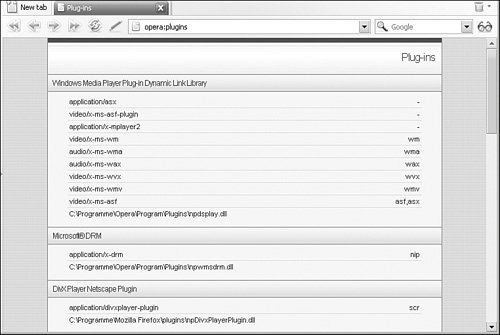Checking for Plug-Ins
In Mozilla browsers, the about:plugins special URL provides a list of all available plug-ins, as Figure 12.1 shows; this works in Opera as well. Figure 12.1. Opera shows a list of all installed plugins. Depending on the chosen browser, there are two ways to actively check for the presence of a certain plug-in:
The following code tries to detect the Flash plug-in. For Internet Explorer, the name of the associated COM object is used; for other browsers, the code is looking for a plug-in called "Shockwave Flash." Detecting the Flash Plug-In (plugin.html)
Warning The array navigator.plugins is also available on Internet Explorer, but empty. Therefore, you have to first check for window.ActiveXObject, then for navigator.plugins. It will not work the other way around. |
- Chapter III Two Models of Online Patronage: Why Do Consumers Shop on the Internet?
- Chapter XIV Product Catalog and Shopping Cart Effective Design
- Chapter XV Customer Trust in Online Commerce
- Chapter XVII Internet Markets and E-Loyalty
- Chapter XVIII Web Systems Design, Litigation, and Online Consumer Behavior